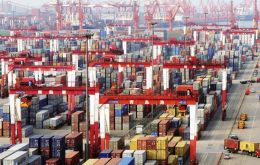MercoPress. South Atlantic News Agency
Energy & Oil
-
Monday, June 4th 2018 - 07:06 UTC
Truckers strike is estimated to have cost Brazilian agriculture some US$ 1.77 billion

The 10-day-long Brazilian striking truckers protests are winding down and companies from meatpackers to soy crushers are resuming operations. Some problems persist in some sectors and will need time to recover. Primary estimates of losses for farmers' sector could reach US$ 1.77bn
-
Friday, June 1st 2018 - 07:35 UTC
Guyana on the global energy map: oil production expected to reach 600.000bpd

The Norwegian oil and gas research firm Rystad Energy is predicting that Guyana's oil sector could generate annual revenue of US$15 billion and that the government would pocket most of the profit generated from the explorations.
-
Thursday, May 31st 2018 - 08:27 UTC
Debilitated Brazilian government challenged with an oil-workers 72-hour strike

Brazilian oil workers began a 72-hour strike on Wednesday in a new blow to President Michel Temer following a nationwide trucker protest that has strangled Latin America's largest economy for over a week. The strike affecting several rigs, refineries, plants and ports is the latest challenge for state-led oil firm Petrobras, whose shares have tumbled nearly 30% in two weeks over fears that political interference would unwind more investor-focused policies.
-
Thursday, May 31st 2018 - 07:40 UTC
Deal to compensate one of the world's most indebted oil company

Petrobras and Brazil’s government are “very close” to resolving a long-running dispute over an oil-rich offshore area, a deputy minister said, dismissing concerns a fuel pricing crisis had emerged as an obstacle in talks.
-
Thursday, May 31st 2018 - 07:20 UTC
Total denied environmental license to drill at the Amazon basin

Brazilian environmental agency Ibama this week rejected French oil company Total SA’s application for an environmental license to drill in the ecologically sensitive Foz do Amazonas basin. It is the fourth time that Ibama has rejected the application and requested additional information.
-
Thursday, May 31st 2018 - 07:02 UTC
Brazil's strike: massive losses: 70m chickens slaughtered; exports of soy, sugar and coffee cancelled

Striking truckers in Brazil have disrupted supplies and exports from one of the world's agricultural powerhouses, triggering the premature slaughter of millions of chickens as feed failed to reach farmers. The strike over high fuel prices has paralyzed Brazil, the top global exporter of soybeans, sugar, coffee and chicken.
-
Wednesday, May 30th 2018 - 09:37 UTC
State of the Nation: “incredibly exciting time for the Falkland Islands and its people”

On Tuesday May 29, Governor Nigel Phillips CBE addressed the elected Legislative Assembly of the Falkland Islands with a message on the State of the Nation.
-
Tuesday, May 29th 2018 - 08:48 UTC
Brazilian cocktail: Wall Street, oil prices, truckers strike and a weak government

A nationwide protest by Brazilian truckers was slow to unwind on Monday, even after the week-long demonstrations against diesel price hikes got the government to cave to their demands, causing stocks and the currency to slide.
-
Friday, May 25th 2018 - 08:50 UTC
Brazil truckers strike: Government says a 15-day truce had been reached

Brazil's government said late Thursday that a deal had been reached with truckers to suspend a four-day-old strike that caused fuel shortages, cut into food deliveries, backed up exports and threatened airline flights.
-
Thursday, May 24th 2018 - 07:32 UTC
China expected to import record volumes of US oil and soy, to help ease trade tensions with the US

China will import record volumes of U.S. oil and is likely to ship more U.S. soy after Beijing signaled to state-run refiners and grains purchasers they should buy more to help ease tensions between the two top economies, trade sources said on Wednesday.
